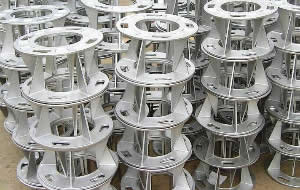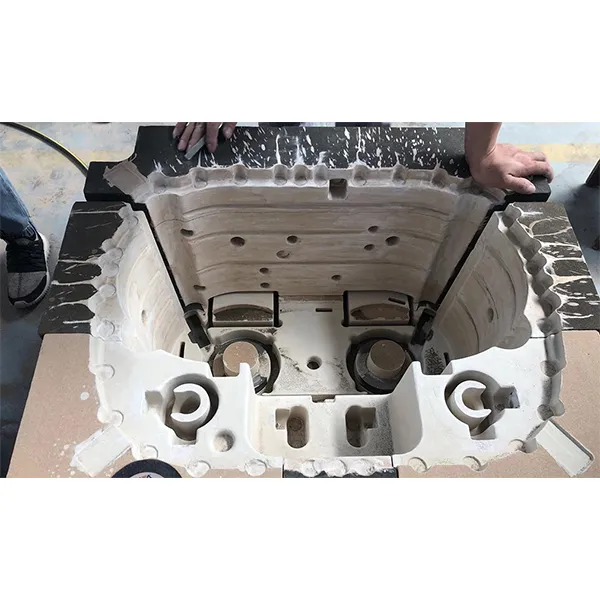The Future of Aluminum Foundries: Advancements and trends Forming the Market
The aluminum foundry market is going through significant transformation. Trick trends highlight the significance of sustainability and efficiency. Advancements in clever manufacturing and automation are coming to be prevalent. Factories are increasingly focused on utilizing recycled materials. This change questions concerning future practices and innovations. Just how will these modifications influence production approaches and market characteristics? The answers may redefine the sector landscape in unexpected methods.
Innovations in Smart Manufacturing Technologies
As the light weight aluminum factory market progresses, advancements in clever production innovations are becoming progressively crucial for boosting performance and efficiency. The integration of automation, artificial intelligence, and the Internet of Points (IoT) is changing standard factory procedures. These innovations enable real-time tracking of processes, permitting instant modifications that enhance result and decrease waste.
Maker learning algorithms assess manufacturing data to determine patterns and forecast upkeep needs, reducing downtime. Robotics are increasingly employed for repeated tasks, freeing experienced employees to concentrate on more complex obstacles. Additionally, digital doubles-- online designs of physical processes-- facilitate simulations that can improve design and operational methods.
The fostering of these smart manufacturing technologies is driving affordable benefits in the aluminum foundry industry. By improving process and enhancing decision-making capabilities, shops can meet expanding market needs while keeping high-quality standards. The future of aluminum shops is indisputably linked to these technological technologies.
Embracing Eco-Friendly Materials and Processes
The light weight aluminum factory industry is increasingly concentrating on environment-friendly materials and processes to boost sustainability. This change consists of the adoption of lasting product sourcing, energy-efficient production techniques, and efficient recycling and waste administration approaches. By integrating these techniques, foundries aim to reduce their ecological influence while maintaining competitiveness on the market.
Lasting Product Sourcing
How can aluminum factories improve their sustainability efforts? Lasting material sourcing has actually emerged as a vital method in attaining this goal. By prioritizing recycled aluminum, foundries can considerably reduce their environmental impact, as recycled products require much less energy and less resources compared to main light weight aluminum manufacturing. Additionally, sourcing products from certified vendors that abide by green techniques advertises liable mining and decreases environmental influence. Factories are likewise discovering alternative products, such as biopolymers and environmentally friendly finishings, to complement traditional aluminum processes. Collaborating with stakeholders, including providers and ecological companies, cultivates advancement in sourcing approaches. Ultimately, accepting sustainable material sourcing not just lines up with worldwide sustainability goals however also settings light weight aluminum shops as leaders in ecologically responsible production.
Energy-Efficient Production Strategies
Aluminum shops are progressively adopting energy-efficient manufacturing methods to enhance their sustainable product sourcing initiatives. These techniques concentrate on reducing power consumption throughout the manufacturing procedure. Advanced innovations, such as induction melting and maximized casting processes, are being applied to decrease the total carbon impact. Furthermore, automation and clever production systems boost operational effectiveness, permitting for better energy monitoring. Shops are also discovering the combination of renewable power resources, such as solar and wind, to power their procedures. By focusing on power effectiveness, light weight aluminum factories not just reduced production costs yet also straighten themselves with global sustainability objectives, making certain a more eco accountable technique to aluminum production while meeting the rising need for environment-friendly practices in the sector.
Recycling and Waste Monitoring
Accepting environment-friendly materials and processes, light weight aluminum foundries are prioritizing recycling and waste administration approaches to enhance sustainability in their procedures. By integrating closed-loop systems, these facilities are decreasing waste and taking full advantage of source performance. Scrap aluminum, a conveniently available product, is being recycled on-site, considerably reducing the demand for virgin products and reducing energy intake. Advancements in arranging and processing technologies additionally promote the recycling of light weight aluminum, making certain that also polluted materials can be repurposed efficiently. Additionally, shops are embracing sustainable practices such as reducing contaminated materials and advertising making use of biodegradable products for product packaging. This commitment to reusing not only lowers ecological effect but additionally improves the economic stability of aluminum shops in an open market.
The Function of Automation and Robotics
Automation and robotics are increasingly changing the aluminum shop market, considerably boosting manufacturing effectiveness. By integrating sophisticated technologies, shops can reduce labor expenses while all at once enhancing safety and security requirements for their labor force. This shift not just improves procedures however additionally places the market for lasting growth in an open market.
Enhanced Production Performance
Reinventing manufacturing processes, the integration of advanced robotics and automation modern technologies has come to be a cornerstone for aluminum shops seeking improved performance. These advancements simplify process, minimize cycle times, and improve product high quality by decreasing human mistake. Automated systems can check assembly line in real-time, permitting prompt adjustments that enhance outcome. On top of that, robotics facilitate the handling of unsafe materials, making sure more secure workplace while enhancing throughput. Anticipating upkeep modern technologies additionally add to performance by preparing for equipment failings, therefore reducing downtime. Therefore, light weight aluminum factories can achieve higher uniformity in their products while reacting more quickly to market demands. This accept of automation is establishing a brand-new criterion for performance and functional quality within the market.

Minimizing Labor Expenses
The shift towards progressed robotics and automation in light weight aluminum factories not only enhances manufacturing efficiency but additionally plays a substantial function in decreasing labor costs. By incorporating automated systems, factories can reduce the reliance on manual work, which frequently involves high incomes and training costs. Robotics improve repetitive jobs such as pouring, molding, and ending up, enabling a higher result with less workers. This technological adjustment not only lowers labor-related expenses but additionally enhances uniformity and high quality in production. Moreover, automation can run around the clock, maximizing functional hours without the associated expenses Precision aluminum casting of overtime or shift differentials. Because of this, aluminum factories can attain considerable financial savings while maintaining affordable pricing in an advancing market landscape.
Improving Security Standards
While standard light weight aluminum foundry procedures often subject employees to hazardous atmospheres, the integration of robotics and automation substantially enhances security criteria within the sector. Automated systems can perform high-risk jobs, such as liquified steel handling and heavy lifting, reducing human exposure to hazardous problems. Additionally, robotics can operate in harmful environments and severe temperatures, efficiently lessening the threat of injury. Advanced monitoring technologies and synthetic knowledge assurance real-time safety and security analyses, permitting instant actions to prospective threats. Automation enhances operations, minimizing the probability of crashes triggered by human error. Therefore, the adoption of these technologies not only boosts safety but likewise cultivates an extra effective and effective functioning atmosphere in aluminum shops.
Enhancing Power Performance in Manufacturing
As light weight aluminum foundries seek to keep competition in a progressing market, enhancing power performance in manufacturing has actually become an important emphasis. By embracing advanced modern technologies such as high-efficiency melting heaters and automated temperature controls, foundries can especially decrease energy consumption. Applying real-time tracking systems enables precise monitoring of energy usage throughout the production procedure, allowing quick changes to enhance performance.
Furthermore, shifting to different energy resources, including eco-friendly options, can better decrease the carbon impact. The combination of power recuperation systems, which recover waste warm for reuse, is becoming progressively common. Educating personnel in energy management techniques guarantees that everyone included in the manufacturing process bears in mind power usage.
These efforts not just lower functional prices but likewise align with worldwide sustainability objectives, placing light weight aluminum factories as responsible players in the market while boosting their overall competition. - Aluminum Casting Company
Innovations in Recycling Aluminum
Advancements in recycling aluminum have gotten energy along with efforts to enhance power efficiency in production. The aluminum market has actually welcomed advanced technologies that enhance the reusing procedure, lowering energy usage and environmental effect. Methods such as hydrometallurgy and brand-new sorting modern technologies boost the removal of light weight aluminum from scrap, boosting return prices and making sure greater quality recycled product.
The development of closed-loop recycling systems allows shops to recycle light weight aluminum without considerable deterioration in high quality, making the process more lasting. Technologies in logistics and collection, including improved monitoring systems and automated sorting, have also played a vital role in increasing the performance of light weight aluminum healing. These developments not only add to a round economic situation yet likewise help minimize the carbon impact connected with light weight aluminum manufacturing. As the demand for lasting methods expands, these advancements position the light weight aluminum factory sector as a leader in liable resource management.
Replying To Market Demands and Customer Trends
Versatility has actually come to be a keystone for aluminum shops responding to evolving market needs and consumer patterns. As industries significantly prioritize sustainability, aluminum factories are shifting in the direction of green methods, consisting of improved reusing processes and minimized carbon footprints. This change straightens with consumer choices for environmentally liable products, driving factories to introduce their offerings.
Additionally, the increase of light-weight materials in aerospace and automobile markets requires advancements in aluminum alloys and casting strategies. Foundries are investing in study and development to create high-strength, light-weight parts that meet rigid efficiency requirements.
Customization has gotten grip, with customers seeking customized solutions. Aluminum factories are leveraging advanced manufacturing innovations, such as 3D printing, to fit details client demands successfully. This responsiveness not just pleases consumer demands however also placements light weight aluminum shops competitively in a vibrant market landscape, ensuring their relevance in an ever-changing commercial atmosphere.

Frequently Asked Inquiries
How Do Light Weight Aluminum Foundries Influence Resident Economies?
Light weight aluminum foundries considerably affect neighborhood economic situations by creating tasks, boosting demand for local suppliers, and adding to community advancement. Their operations frequently lead to boosted tax revenues, which can fund crucial civil services and facilities improvements.
What Are the Safety And Security Rules for Aluminum Foundry Employees?
Safety policies for light weight aluminum factory workers consist of necessary personal safety tools, proper air flow systems, routine training on dangerous materials, and adherence to guidelines established by work-related health and wellness managements to lessen risks and warranty worker safety and security. - Aluminum Foundry
Exactly How Does Aluminum Recycling Affect Global Supply Chains?
Light weight aluminum recycling substantially decreases need for raw materials, improves resource effectiveness, and maintains prices. This change impacts worldwide supply chains by cultivating a round economy, advertising sustainability, and making sure an extra resilient market in changing markets.
What Profession Opportunities Exist in the Light Weight Aluminum Foundry Market?
Numerous job opportunities exist in the light weight aluminum foundry market, consisting of duties in engineering, high quality control, manufacturing monitoring, and r & d. Skilled labor positions such as mold and mildew manufacturers and machine operators are likewise sought after.
Just How Do International Profession Policies Influence Aluminum Foundries?
International trade policies substantially impact aluminum foundries by influencing import tolls, supply chain dynamics, and market access. These elements can influence operational expenses, competition, and general productivity within the international light weight aluminum production landscape.
By focusing on recycled light weight aluminum, foundries can substantially reduce their ecological impact, as recycled products need less energy and fewer resources compared to primary light weight aluminum manufacturing. Light weight aluminum foundries are increasingly adopting energy-efficient production strategies to enhance their lasting product sourcing efforts. Automation and robotics are progressively transforming the aluminum shop sector, substantially improving manufacturing effectiveness. The shift towards progressed robotics and automation in light weight aluminum factories not only enhances manufacturing performance yet likewise plays a significant role in lowering labor prices. As light weight aluminum factories seek to keep competition in a progressing market, enhancing power performance in production has actually arised as a vital focus.